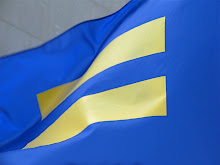I am posting these comments that I included in my poem "Negation" because I feel they are important in terms of who I am intellectually and may serve to explain not only that poem but many of the other poems I have done previously. I really do want to start a dialogue on this and always welcome comments:
I think that loss and forgetting history figures prominently into queer culture. Older queer men who have lived through AIDS seem to be forgetting major events that have occurred in "queer history." This is nothing involuntary; rather, these men have ignored history because it is painful, because it disrupts any notions of comfort, exposing the full face of the monster lurking in humanity.
These assimilationist politics reflect the larger problem that is occurring among queer youth today. Far from the so-called increasing acceptance of queers based in marriage "equality", I think that the unapologetic gay bashing and bullying demonstrates the ill-effects of this denial of history (which is inspired, in part, by "Feeling Backward" and partly by the piece @harveymilk wrote entitled "Levity and Gravity.")
To deny history only creates psychical uncertainty and distress; history never goes away. The feelings of loss, shame and guilt are not gone in this denial. History is not some dead Truth of past events, but informs the present in so many respects. It's literally alive with each breath we take.
And so I wonder what the full consequences of this denial by an older generation are. Who teaches the kids history? Who mentors them? Is the idea that is pushed "that we are like everyone else" and that our "love is equal" problematic? On a basic level, yes, we do want to be loved and love, but how is that love defined and constrained through a heteronormative matrix? What about those who want to be fluid in who they love? Can anybody love multiple people at the same time? Are you viewed like some zoo animal when you walk down the street holding your lover's hand or when you go in for a kiss?
And so on and so forth. The intersectionality of queer history, loss and erasure; the psyche (and deconstructing theories of psychology which have victimized and dehumanized queer people); LGBT politics nationally and locally; youth; personal experiences as queer man; and academic meditations on gender, class, race, etc. really have informed what appears to be a rather simple piece on the surface.
Subscribe to:
Post Comments (Atom)

I've read this a couple times and really like it. Not much to add at the moment, though. You might be interested in the work of Christopher Castiglia or Charles Morris III, both of which have addressed queer memory in literary and rhetorical studies. Michael Warner discusses it a bit in The Trouble with Normal as well, though you're probably aware of that.
ReplyDelete